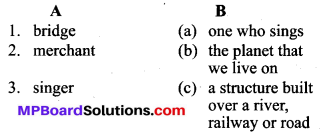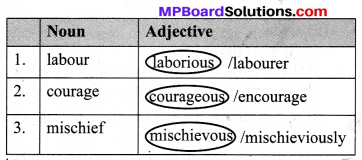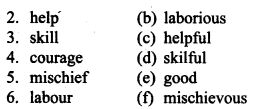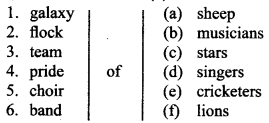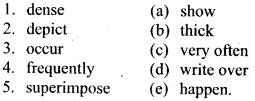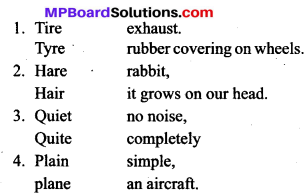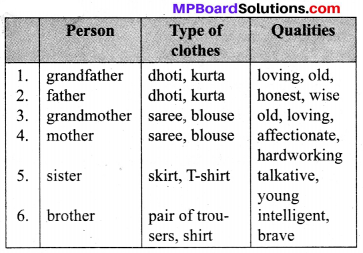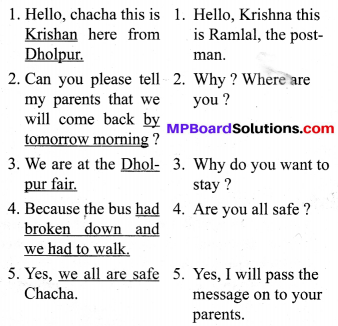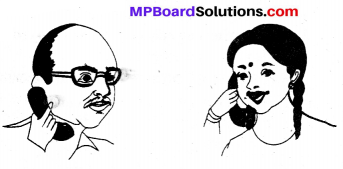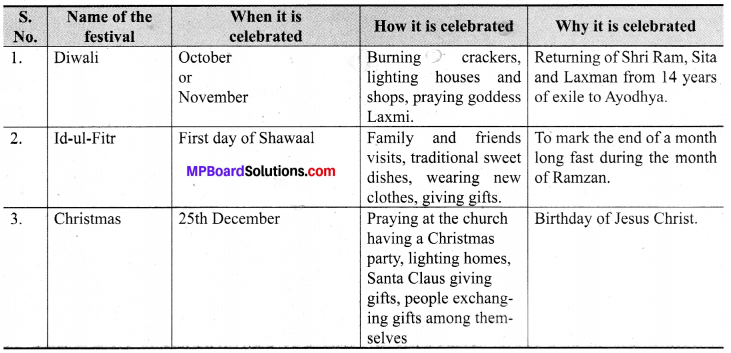Get Updated MP Board Solutions for Class 7 General English Grammar Questions and Answers in PDF Format and download them free of cost. These are provided as per the latest exam pattern and syllabus. Access the topics of Chapter wise and communication skills, grammer part through the direct links available depending on the need. You can Download MP Board Class 7 English Solutions and can score highest grade in examination. Clear all your queries on the Mp Board Solutions for Class 7 English Chapter 21 Tansen Questions and Answers Subject by using the Madhya Pradesh State Board Solutions for existing.
MP Board Class 7th General English Grammar
If you are eager to know about the Madhya Pradesh State Board Solutions for Class 7 English you will find all of them here. You can identify the knowledge gap using these MP Board Solutions for English PDF and plan accordingly. Don’t worry about the accuracy as they are given after extensive research by people having subject knowledge along side from the latest English Syllabus.
Artticle (आर्टिकल)
उपपद
Article तीन हैं – (1) a, (2) an,(3) the.
a तथा an का प्रयोग एकवचन के लिए होता है। the का प्रयोग एकवचन तथा बहुवचन दोनों के लिए होता है।
(1) A का प्रयोग – Consonant (व्यंजन) से प्रारम्भ होने वाले एकवचन की जातिवाचक संज्ञा के पूर्व होता है। जैसे-a book, a man, a dog, a cat आदि।
(2) An का प्रयोग – vowels (a, e, i, 0, u) स्वर से प्रारम्भ होने वाले एकवचन की जातिवाचक संज्ञा के पूर्व होता है।
जैसे – An apple, an eye, an inkpot, an orange, an umbrella आदि।
(3) The का प्रयोग-किसी खास वस्तु, अनोखी वस्तु, नदी, पहाड़, प्रसिद्ध ग्रन्थ, अखबार के नाम आदि के पहले होता है। जैसे-The sun, The earth, The Ganga, The Indian Ocean, The Taj, The East आदि। किसी खास या पूर्व परिचित वस्तु का बोध कराने के लिए भी The का प्रयोग किया जाता है। जैसे-The girl in blue is my sister.
Exercise
Fill in the following blanks with a, an or the as required
- ……….. train was ………. hour late.
- Srilanka is ………. island.
- He is ……….. honest man.
- It is ………… large egg.
- ……….. umbrella is ……. use full thing.
- ………… rose is ………. loveliest of all flowers.
- He is ……… M. A. from Allahabad university.
- …… Gita is ………. holy book of Hindus.
Answer:
- The, an
- an
- an
- a
- An, a
- The, the
- an
- Thea, the.
The Pronoun (द प्रोनाऊन)
सर्वनाम
Pronoun वह शब्द है जिसका प्रयोग संज्ञा (Noun) के स्थान पर होता है। जैसे –
Hari is my friend. He lives in Delhi.
यहाँ He, सर्वनाम (Pronoun) है। यह Noun-Hari के स्थान पर आया है।
Kinds of Pronoun (सर्वनाम के प्रकार)
1. Personal Pronouns (पुरुषवाचक सर्वनाम)
उदाहरण – I, We, You, He, She, It, They, Me, Us, Him, Her, Them, Mine, Ours, Yours आदि।
2. Reflexive Pronouns (निजवाचक सर्वनाम)
उदाहरण – Myself, yourself, himself, herself, ourselves, themselves.
3. Demonstrative Pronouns (संकेतवाचक सर्वनाम)
उदाहरण – this, that, these, those.
4. Interrogative Pronouns (प्रश्नवाचक सर्वनाम)
उदाहरण – Who, which, whom, whose, what.
5. Relative pronouns (सम्बन्धवाचक सर्वनाम)
उदाहरण – Who, Whom, Whose, Which, That, What, आदि।
6. Indefinite Pronouns (अनिश्चयवाचक सर्वनाम)
उदाहरण – anybody, somebody, nobody, someone, one, none, all, mony, few.
7. Distributive Pronouns (प्रत्येकवाच सर्वनाम)
उदाहरण – each, either, neither.
8. Reciprocal Pronouns (पारस्परिक सर्वनाम)
ये दो pronouns से मिलकर बनते हैं और केवल दो हैं – each other, one another.
9. Possessive Pronouns (अधिकार वाचक सर्वनाम)
उदाहरण – mine, yours, hers. आदि।
Exercise
Pick out the pronouns in the following sentences :
(निम्न वाक्यों में से सर्वनाम छाँटिए।)
- I know him very well.
- She has a pretty doll.
- They are playing cricket.
- I shall beat you.
- The boy who made a noise was punished.
- The man whose bag was stolen has come.
- Where is the pen which I gave you.
- Why do you abuse one another ?
- These are nice girls.
- They decided to help each other.
Noun (नाऊन)
संज्ञा
Countable and uncountable
संज्ञाओं (Nouns) को उनके गिने जाने के आधार पर दो प्रकार में बाँटा गया है –
(1) Countable Nouns – (गिने जाने योग्य संज्ञाएँ)
जैसे-dog, pen, country, table, road आदि।
(2) Uncountable Nouns – (नहीं गिने जाने योग्य संज्ञाएँ)
जैसे – butter, juice, sugar, hatred, love, sickness. आदि।
The Adverb (एडवर्व)
क्रिया-विशेषण
Adverb (क्रिया विशेषण) वह शब्द है जो किसी Verb (क्रिया), Adjective (विशेषण) या Adverb (क्रिया-विशेषण) की विशेषता बताता है। जैसे
The milk is very hot. Sarita ran fast but could not win the race.
उपरोक्त वाक्यों में very और fast क्रिया-विशेषण हैं।
Kinds of Adverbs
(1) Adverbs of Time (काल-वाचक)
उदाहरण-now, always, never, already, shortly, today, tomorrow आदि।
(2) Adverbs of Place (स्थान-वाचक)
उदाहरण-here, there, in, below, hence, thence, inside आदि।
(3) Adverbs of Manner (रीति वाचक)
उदाहरण-quickly, fast, well, easily, bravely आदि।
(4) Interrogative Adverbs (प्रश्नवाचक)
उदाहरण-when, where, how, why, how much आदि।
(5) Relative Adverbs (सम्बन्ध वाचक)
उदाहरण-when, where, how, why आदि।
(6) Adverbs of Degree (परिणामवाचक)
उदाहरण-very, much, quite, wholly, exactly आदि।
(7) Adverbs of Affirmation and Negation (स्वीकार वाचक एवं निषेध वाचक)
उदाहरण-yes, no, not, certainly, indeed आदि।
(8) Adverbs of Number (संख्या वाचक)
उदाहरण-once, twice, first, again आदि।
(9) Adverbs of Reason (हेतु वाचक)
उदाहरण-therefore, so, hence.
Exercise
Pick out the adverbs in the following sentences :
(निम्नलिखित वाक्यों में से क्रिया-विशेषण छाँटिए)
- The soldiers fought bravely.
- You can stay here.
- He went far into the forest.
- Tell me quickly as you can.
- Do you know why he came here ?
- Have you ever been to Mathura ?
- Why do you not work carefully ?
- Come inside.
- This shirt is too loose for me.
- I went there only once.
Voice (वाइस)
वाच्य
Voice (वाच्य) क्रिया का वह रूप है जो यह बताता है कि subject (कर्ता) कार्य का करने वाला है या उसके प्रति कोई कार्य किया गया है।
Voice दो प्रकार के होते हैं –
(1) Active Voice और Passive Voice
जैसे – The hunter killed a lion-Active
शिकारी ने शेर को मार डाला।
The lion was killed by the hunter-Passive
शेर शिकारी के द्वारा मार डाला गया।
यहाँ, पहले वाक्य में कर्ता (subject) hunter कार्य करने वाला है इसीलिये verb “killed” Active voice में होगा। जबकि दूसरे वाक्य में subject lion’ के प्रति कार्य हो रहा है इसीलिये verb ‘was killed’ passive voice में होगा।
Active से Passive बनाना
(1)Active से Passive में बदलने के लिए ‘to be’ क्रियाओं का प्रयोग किया जाता है। सबसे पहले Object (कर्म) को Subject (कर्ता) के स्थान पर रखते हैं। इसके पश्चात् tense के अनुसार क्रिया ‘to be’ को फिर मुख्य क्रिया (verb) की 3rd form को रखते हैं और अन्त में कार्य करने वाले (doer) को शब्द by के बाद रखते हैं।
‘To be’ क्रियाएँ आठ हैं। बिना इनके passive नहीं बन सकता है।
Verb to be’.- is, are, am, was, were, be, been,being.
केवल transitive verb को passive voice में बदलते हैं क्योंकि उसका object होता है।
निम्न वाक्यों को पढ़ें –
Active – We like mangoes.
Passive – Mangoes are liked by us.
Active – The dog cought the rat.
Passive – The rat was cought by the dog.
Aetive – He is flying a kite.
Passive – A kite is being flown by him.
कभी-कभी कुछ nouns के दो objects होते हैं। Passive Voice में उनमे से किसी को भी Subject बनाया जा सकता है परन्तु अधिकतर Indirect Object को Subject की तरह प्रयोग करते हैं।
उदाहरण –
Active – He gave me a book.
Passive – I was given a book by him.
Or
A book was given (to) me by him.
Active – Ram told me stories at night.
Passive – I am told stories at night by Ram.
Or
Stories are told me at night by Ram.
Change of Tense (काल में परिवर्तन)
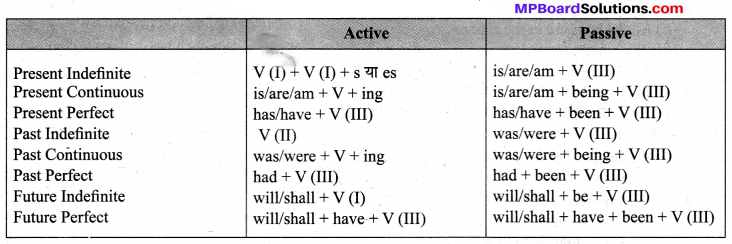
Exercise
Change the following sentences into Passive Voice :
- The teacher teaches us English.
- The peon rings the bell.
- The Police arrested the thief.
- The servent had beaten Ram.
- The carpenter was making a table.
- They had finished the work before the teacher came.
- Our team will win the match.
- The postman will help us.
- He will visit me tomorrow.
- Have you broken the cup ?
The preposition (द प्रिपोजिशन)
सम्बन्धसूचक अव्यय
परिभाषा – वे शब्द जो किसी Noun या Pronoun से पूर्व प्रयोग में आये हों और उनका सम्बन्ध वाक्य के किसी अन्य Noun या Pronoun के साथ स्थापित हो, Prepositions कहलाते हैं।
A preposition is a word placed before a noun or a pronoun to show the relation of the person or thing denoted by it.
Relations expressed by Prepositions
1. Preposition of Time – कुछ Prepositions समय सूचक होते हैं, जैसे-
- He came at seven.
- I study for seven hours daily.
- She is absent from class for five days.
2. Preposition of Place – कुछ Prepositions स्थान सूचक होते है, जैसे-
- He was in his room.
- They are coming home from the school.
- I stood before him.
3. Prepositions of Movement – Prepositions गतिसूचक/साधन सूचक होते हैं, जैसे-
- I travelled by train.
- I came by car.
- We went there on his bike.
Use of some other Prepositions
1. At, In – At छोटे स्थान के साथ प्रयोग किया जाता है
In बड़े स्थान के साथ प्रयोग किया जाता है। जैसे –
(i) He lives at Bhopal.
(ii) We live in India.
2. In, into – In स्थिति को बताता है और Into गति का बोध करता है। जैसे –
(i) All the boys are in the classroom.
(ii) We bought the tickets and went into the hall.
3. With, by – With यन्त्र के साथ प्रयोग होता है और by कार्य करने वाले के साथ प्रयोग किया जाता है। जैसे –
(i) We cut the apple with the knife.
(ii) The snake was killed by the farmer.
4. Since, for-Since निश्चित समय के साथ (जैसे दिन का नाम या तिथि आदि) और For समय की अवधि के साथ प्रयोग किया जाता है। जैसे –
(i) He has been ill since Wednesday.
(ii) Raj has been absent for three days.
5. Between, among-Between दो व्यक्तियों तथा Among दो से अधिक व्यक्तियों के लिए प्रयोग किया जाता है। जैसे-
(i) Divide these mangoes between Ram and Ravi.
(ii) The gentleman divided his property among his four sons.
6. On, upon-On गतिहीनता तथा Upon गतिशीलता के लिए प्रयोग किया जाता है। जैसे –
(i) The cat is sitting on the table.
(ii) The dog sprang upon the table.
7. In, within-In समय की अवधि की समाप्ति का बोध कराता है और Within समय की अवधि के भीतर का बोध कराता है। जैसे –
(i) I shall come back in a week. (एक सप्ताह की समाप्ति पर।)
(ii) I shall come within a week. (एक सप्ताह समाप्त होने से पूर्व।)
8. Below, beneath-Below पद के सन्दर्भ में और Beneath स्थान के सन्दर्भ में प्रयोग किया जाता है। जैसे –
(i) Your brother is below my rank.
(ii) The lion sat beneath a tree.
9. Beside, besides-Beside का अर्थ है-पास (by the side of) जबकि Besides का अर्थ है-अतिरिक्त जैसे –
(i) The boys stood beside the teacher’s chair.
(ii) Besides the principal other teachers spoke in the prayer assembly.
10. With, without-With का अर्थ है-साथ और without का अर्थ-बिना (रहित)। जैसे –
(i) Come to me with your brother.
(ii) Come to the field without anything.
Exercise
Fill in the blanks with the appropriate prepositions :
- She is looking ……….. a job. (to, for)
- I have invited him ……… dinner. (to, for)
- Your sister is angry ……… you. (with, from)
- Your letter is full ……….. mistakes. (of, by)
- I met him ………. chance. (by, in)
- They came here …….. Monday.(on, at, since)
- She prefers tea ………. coffee. (to, thanong)
- Distribute these sweets ………. the children. (between, an jong)
- The frog jumped ………. the pond. (in, into)
- The book is ………. the table. (on, in, over)
Answer:
- For
- to
- with
- of
- by
- on
- to
- among
- into
- on.
Direct and Indirect Narration
(डाइरेक्ट एण्ड इन्डाइरेक्ट नरेशन)
Direct Narration में बोलने वाले के कथन को ज्यों का त्यों ही दोहरा दिया जाता है। परन्तु Indirect Narration में उस कथन का भाव प्रकट किया जाता है।
जैसे-He said to me, “I weep to see you.” (Direct)
He told me that he wept to see me. (Indirect)
निर्देश :
(1) Said को Told में बदल देते हैं। Inverted Commas को हटा देते हैं तथा Persons में परिवर्तन निम्नलिखित रूप में करते हैं।
(2) Ist Person के Pronoun (I, we, us, our) का परिवर्तन Direct speech के Subject (कर्ता) के Person के अनुसार होता है। IInd Person के Pronoun (you, your) का परिवर्तन Object के Person के अनुसार होता है तथा IIIrd person के Pronoun में कोई भी परिवर्तन नहीं होता है।
(3) निकटता प्रकट करने वाले शब्दों में परिवर्तन निम्नलिखित रूप से किया जाता है –
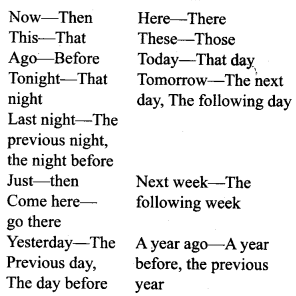
(4) Tense (काल) में परिवर्तन – (1) Reporting Verb के Present या Future Tense में होने पर Reported Verb के Tense में कोई परिवर्तन नहीं होता है। (2) Reporting Verb के Past Tense में होने पर
Reported Verb के Tense में परिवर्तन होता है –
(i) Simple present का Simple past हो जाता है –
Direct – He said, “She works hard.”
Indirect – He said that she worked hard.
(ii) Present Continuous का Past Continuous हो जाता है –
Direct-He said, “She is reading a book.”
Indirect-He said that she was reading a book.
(iii) Present perfect का Past perfect हो जाता है-
Direct-He said, “She has done her work.”
Indirect-He said that she had done her work.
(iv) Present Perfect Continuous का Past Perfect Continuous हो जाता है-
Direct-He said, “She has been reading a book for two hours.”
Indirect-He said that she had been reading a book for two hours.
(v) Simple past का Past Perfect हो जाता है-
Direct-He said, “She wrote a letter.”
Indirect-He said that she had written a letter.
(vi) Past Continuous का Past Perfect Continuous हो जाता है-
Direct-He said, “She was writing a letter.”
Indirect-He said that she had been writing a letter.
Shall का should, may का might, can का could हो जाता है तथा सदा सत्य और ऐतिहासिक तथ्यों का Tense नहीं बदला जाता।
Interrogative (Questions)
Direct-Rahul said to Rama, “Is it easy to ride a bicycle ?”
Indirect-Rahul asked Rama if it was easy to ride a bicycle.
Direct-The bird said to the Prince, “Why are you weeping ?”
Indirect-The bird asked the Prince why he was weeping.
Command and Orders
Direct-“Get some sleep”, his father said.
Indirect-His father told him to get some sleep.
Direct-“Don’t stay up late,” his mother said.
Indirect-His mother told him not to stay up late.
Direct-“Please help me,” Hari said to me.
Indirect-Hari requested me to help him.
Exercise
Rewrite the following sentences in indirect form of narration :
- The farmer said, “The rain is useful for crops.”
- Ram said to sheela, “I am your brother.”
- The teacher said, “The sun rises in the east.”
- Akshay said, “Who is running on the roof ?”
- His brother said to me, “Where do you go daily at this time?”
- She said to you, “When do you go for a walk?”
- Anu said to me, “From where have you bought this shawl ?”
- Rohan said to the boy, “Why did you not take medicine ?”
Answers :
- The farmer said that the rain is useful for crops.
- Ram told Sheela that he was her brother.
- The teacher said that the sun rises in the east.
- Akshay asked who was running on the roof.
- His brother asked me where did I go daily at that time.
- She asked you when you went for a walk.
- Anu asked me from where I had bought that shawl.
- Rohan asked the boy why he had not taken medicine.
Degrees of Comparison
(डिग्रीज़ ऑफ कम्परिजन),
गुण या दोष की अधिकता या कमी बताने के लिए Adjective की तीन अवस्थाएँ होती हैं-
(1) Positive degree
(2) Comparative degree
(3) Superlative degree.
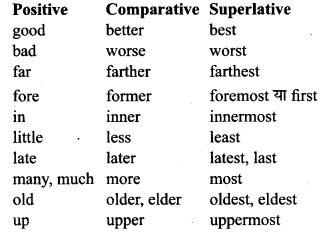
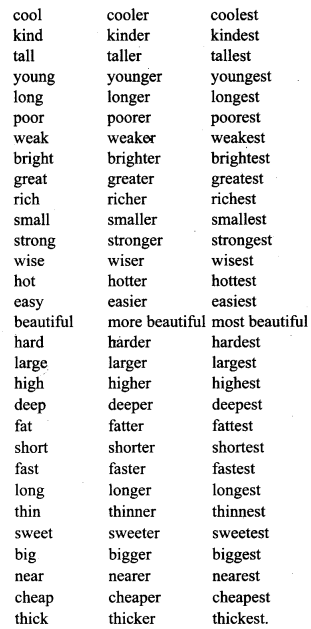
Exercise
Fill in the blanks with a suitable word given in brackets :
- He is ………… than other boys in the class. (stronger, strong)
- Sita is …………. than Gita. (rich, richer)
- Ram is not as …………. as Shyam. (poor, poorer)
- Of the three mangoes this is the …………. (sweet, sweetest)
- Ravi is …………. than his brother. (clever, cleverer)
- Iron is the …………. of all the metals. (hardest, harder)
- She is not so …………. as her sister. (intelligent, more intelligent)
- It is the ……….. among all books I have ever read. (good, better, best)
Answer:
- stronger
- richer
- poor
- sweetest
- cleverer
- hardest
- intelligent
- best.
Complex Sentences
(मिश्रित वाक्य)
Complex sentence में एक Principal Clause (प्रधान उपवाक्य) तथा शेष. Subordinate Clause होते हैं। इस तरह clause तीन प्रकार के होते हैं – (1) Principal Clause, (2) Subordinate Clause (आश्रित उपवाक्य) तथा (3) Co-ordinate clause (समानपदीय उपवाक्य)।
Subordinate Clause तीन प्रकार के होते हैं –
(1) Noun Clause
(2) Adjective Clause
(3) Adverb Clause.
Adjective Clause
(एडजेक्टिव क्लॉज़)
Adjective clause यदि एक वाक्य (sentence) में आये हुए Noun या Pronoun के लिए दूसरे वाक्य में कोई बात कही गई है तो दूसरे वाक्य को Adjective clause बना देते हैं।
जैसे –
1. I saw a cat. The cat was lying on the road.
Answer:
I saw a cat who was lying on the road.
2. I gave her a pencil. The pencil was very cheap.
Answer:
I gave her a pencil which was very cheap.
3. The girl is wearing a red sweater. She is Savita.
Answer:
The girl, who is wearing a red sweater, is Savita.
4. Arif is wearing a blue shirt. He is the tallest boy in the class.
Answer:
Arif, who is the tallest boy in the class, is wearing a blue shirt.
5. Seema is in class ten. She is going to play in the national team.
Answer:
Seema, who is going to play in the national team, is in class ten.
6. Mohan is a swimming champion. He is going to teach his friends to swim.
Answer:
Mohan, who is a swimming champion, is going to teach his friends to swim.
7. Asma helped the boy. He is blind.
Answer:
Asma helped the boy, who is blind.
Interrogative Sentences
(प्रश्नवाचक वाक्य)
निर्देश-Simple Positive वाक्यों को Interrogative बनाने के लिए सहायक क्रिया (Auxiliary verb), मुख्य क्रिया (Main verb) तथा प्रश्नवाचक शब्दों (Question words) की सहायता लेते हैं। जैसे-
(1) उसके पास नई कार है।
She has a new car. (Positive)
Has she a new car? (Interrogative)
(2) राम एक अच्छा लड़का है।
Ram is a good boy. (Simple)
Is Ram a good boy? (Interrogative)
Change the following sentences into Interrogative one :
1. मीनू शिमला जा रही है।
Meenu is going to Shimla.
Is Meenu going to Shimla ?
2. वह यहाँ आ सकता है।
He can come here.
Can he come here?
3. राम एक पत्र लिख चुका है।
Ram has written a letter.
Has Ram written a letter?
4. वह एक पत्र लिखती है।
She writes a letter
Does she write a letter ?
5. उसने एक गीत गाया।
She sang a song.
Did she sing a song ?
6. यह एक पुस्तक है।
This is a book.
What is this?
7. वह हॉकी खेल रही है।
She is playing hockey.
What is she playing?
8. वह एक कार चला रहा है।
He is driving a car.
What is he doing?
9. मैं अपने भाई से प्रेम करता हूँ।
I love my brother.
Whom do you love ?
10. मैं ने लता को एक पुस्तक दी।
I gave a book to Lata.
Who did you give a book to ?
11. मुझे भोपाल में रहना पसन्द हैं।
I like to live in Bhopal.
Where do you like to live ?
12. शाहजहॉ ने ताजमहल बनाया।
Shahjahan built the Taj.
Who built the Taj ?
Exercise
Remove ‘too’ in the following sentences :
- He is too weak to walk.
- She spoke too slowly for us to hear.
- It is too cold for us to go out.
- The boy ran too slowly to catch the bus.
- The question is too difficult for us to solve it.
- The room is too dark for us to work in it.
- The tea is too hot for me to drink.
- The fruits are too sour for us to eat them.
Transformed sentences
- He is so weak that he cannot walk.
- She spoke so slowly that we could not hear.
- It is so cold that we cannot go out.
- The boy ran so slowly that he could not catch the bus.
- The question is so difficult that we cannot solve it.
- The room is so dark that we cannot work in
- The tea is so hot that I cannot drink it.
- The fruits are so sour that we cannot eat them.
Use of Idioms and Prepositional Phrases
1. Worn out (पुराना, फटा हुआ) –
Use – My coat is really worn out.
2. Well dressed (अच्छे कपड़े पहने हुए)-
Use-He was well-dressed.
3. Poor dressed (ख़राब वस्त्र पहने हुए)-
Use-Mohan was seen poorly dressed in the party.
4. Highly priced (बहुत कीमती)-
Use-Meena bought a highly priced dress.
5. Out of danger (खतरे से बाहर)-
UseRavi had a heart attack but he is out of danger now.
6. In the middle of (बीच में,मध्य में)
Use-In the middle of the session, he fell ill.
7. In the lead (प्रारम्भ में आगे)-
Use-Mohan started his race in the lead.
8. Win someone’s heart (दिल जीत लेना)
Use-Prakash won everyone’s heart with his performance.
9. Afraid of (भयभीत)-
Use – He did his hard work but was afraid of being failed.
10. At the end of (अन्त में)-
Use-At the end of the race, he reached the point first.
11. In a bad state (ख़राब दशा में)-
Use-He continued his studies in a bad state of his health.
12. In good order (अछि दशा में)-
Use-I found my machines in the factory in good order.
13. To visit (अवलोकन करना)-
Use-Many people from other countries come to visit the Taj.
14. By the light (रात तक)-
Use-Dr. Dass was reading his book by the light of a small lamp.
15. Dressed in (कपड़े पहने)-
Use-He was dressed in white.
16. Head to foot (सिर से पैर तक)
Use-His body was covered with mud from head to foot.
17. Pull off (खींच डालना)
Use-He pull the curtain off.
18. Run away (भाग जाना)-
Use-In the end of the function, everyone runs away.
19. Go away (चले जाओ)-
Use-Go away from here.
20. Drive away (खदेड़ देना)-
Use-Robbers were driven away.
21. Got away (भाग गया)-
Use-The servant got away though his master treated him well.
22. Walk away (पीछे हटना)-
Use-we should not walk away when we find someone in need.
23. Look into (जाँच करना)-
Use-He looked into the box.
24. Look for (खोजने की कोशिश करना)-
Use-Are you still looking for a job?
25. Look upto (गणना करना)-
Use-He is looking upto him as a good soldier.
26. Look forward to (आशा करना,कामना करना)-
Use-We are looking forward to see you again.
27. Empty vessels make much noise (यथा चना बाजे घना)-
Use-Persons without perfect skill are empty vessels which make much noise.
28. Slow but steady (परिश्रमी होना)-
Use-Mohan will get success because it is true that he is slow but steady.
29. Burn the midnight oil (मेहनत करना)-
Use-These days students are burning the midnight oil.
30. Born with a silver spoon in one’s mouth (धनि परिवार में जन्म लेना)-
Use-Jawahar Lal Nehru was born with a silver spoon in his mouth.
31. Three piece (तीन भागों का)
Use-I have three piece blue suit.
32. Board a bus (बस में सवारी करना)-
Use-We have to board a bus at Pipariya to go to Panchmarhi.
33. Get lost (बिछुड़ जाना)-
Use-The child held his mother’s hand tightly so that he may not get lost.
34. Find out (खोजना)-
Use-Find out the correct solution of this sum.
35. Joy rides (प्रसन्नता देने वाली सवारियाँ)-
Use-There were many joy rides at the fair.
36. Broke down (रुक जाना)-
Use-My scooter broke down, when I was going home.
37. Keeping a watch (रखवाली करना)-
Use-Moti, the dog is keeping a watch on all the people going inside the gate.
38. Go round (चक्कर मारना)-
Use-The Principal like to go round the school to see the classes.
39. The ship of the desert (रेगिस्तान का जहाज)-
Use-The Camel is known as the ship of the desert.
40. Lame excuse (बहाना बनाना)-
UseRamesh has not done his homework so he made a lame excuse of falling sick.
41. Fool proof (पक्की सुरक्षा)-
Use-No security can be called fool proof.
42. To work hard (कठिन परिश्रम करना)-
Use-Shyam is supposed to work hard to secure good marks.
43. To turn a blind eye (आँखें मूँद लेना)-
Use-The Police turned a blind eye when they saw the thief was running away.
44. To leave one’s footprints (पदचिह्न छोड़ना)
Use-If you leave your footprints on the sand at a beach, the sea is sure to wash them away.
Homophones
(समानोच्चारीत शब्द)
उच्चारण में समान लगने वाले परन्तु अर्थ में भिन्न शब्दों को Homophone (समानोच्चारीत शब्द) शब्द कहते हैं।
I. (1) See-sea
(2) Sale-sail
(3) Sell-cell
(4) Knew-new
(5) There-their
(6) Peace-piece
(7) Check-cheque
(8) Blue-blew
(9) Heard-herd
(10) Right-write.
Use (1) See – I see a snake in the garden.
Sea – The ship is sailing on the sea
(2) Sale – National Herald has the largest sale.
Sail – The ship sails on the sea.
(3) Sell – He sells newspaper.
Cell – He lives in a small cell.
(4) Knew – He knew his address.
New – New plants are planted.
(5) There – There are four students in the class.
Their – They help their friends.
(6) Peace – There was peace in the forest.
Piece – A piece of bread was given to the dog.
(7) Check – Teacher checks the exam copy.
Cheque – Payment can also be made through cheque.
(8) Blue – He is wearing a blue shirt.
Blew – The wind blew hard.
(9) Heard – I heard a great noise.
Herd – A herd of cows was grazing.
(10) Right – Give right answer to the questions.
Write – I write a letter.
II. (1) Tire-tyre
(2) Hare-hair
(3) Quiet-quite
(4) Plain-plane
(5) Hear-here
(6) Fair fare.
Use –
(1) Tire – He is tired of hard labour.
Tyre – Tyre is a rubber covering on wheels.
(2) Hare – Hare.runs in the garden.
Hair – Hair grow on our head.
(3) Quiet – You must be quiet in the class.
Quite – We waited for quite a long period.
(4) Plain-He is a man of plain thinking.
Plane-He had to fly by a plane to Mumbai.
(5) Hear-We hear with our ears.
Here-He came here.
(6) Fair-Mohan went to a fair with his friends.
Fare-What is the fare from Bhopal to Indore ?
III.(1) Ate-He ate fruits only.
Eight-Eight boys are playing.
(2) Bye-He said goodbye to his friends.
Buy-You should buy books of good writers
(3) Weak-He is weak in English.
Week-I go to Agra twice a week.
(4) One-One thing at one time.
Won-Rana Pratap won many battles.
(5) I-i – live in Bhopal.
Eye-We see with our eyes.
IV.
(1) Bee (बी) = मधुमक्खी
Be (बी) = होना
(2) One (वन) = एक
Won (वन) = जीत
(3) Sea (सी) = समुद्र
See (सी) = देखना
(4) Eight (एट) = आठ
Ate (एट) = खाया
(5) Idle (आइड्ल्) = सुस्त,
Idol (आइड्ल) = मूर्ति।
(6) Hour (आवर्) = समय,
Our (आवर्) = हमारा।
(7) Too (टू) = भी,
Two (टू) = दो।
Antonyms (विलोम)
विरोधी अर्थ वाले शब्द Antonyms (विलोम) कहे जाते हैं।
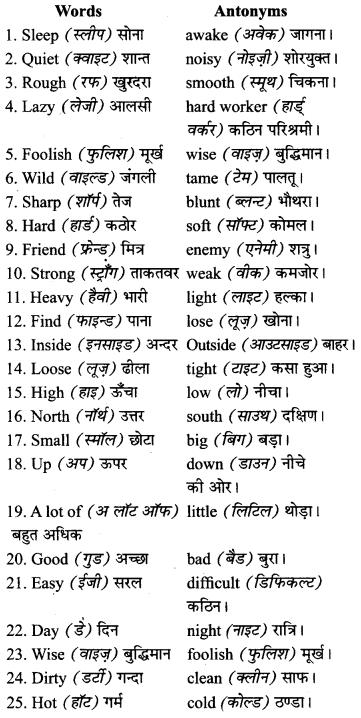
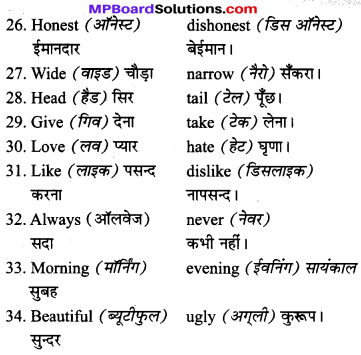
Singular/Plural
(एकवचन/बहुवचन)
संज्ञा के दो वचन होते हैं –
1. Singular number-एकवचन (एक के लिए)
2. Plural number-बहुवचन (एक से अधिक के लिए)
(1) कुछ शब्द ऐसे होते हैं जिनका एकवचन और बहुवचन ‘एक-सा होता है। जैसे –
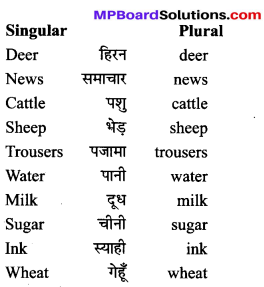
(2) कुछ शब्दों के अन्त में s या es लगाकर बहुवचन बनाते हैं। जैसे –
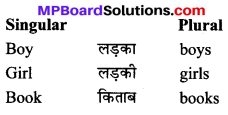
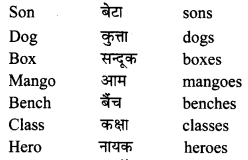
(3) कुछ शब्दों के अन्त में y हटाकर ies लगाकर बहुवचन बनाते हैं। जैसे –
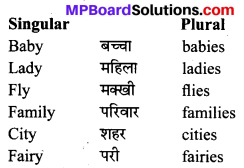
(4) कुछ शब्दों के अन्त में f या fe हो तो उसे हटा कर ves लगाकर बहुवचन बनाते हैं। जैसे –
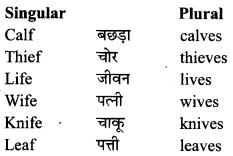
(5) कुछ अन्य शब्द जिनके बहुवचन बनाने के विशेष नियम नहीं हैं। जैसे –
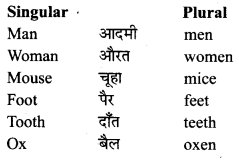
Prefix and Suffix
(उपसर्ग तथा प्रत्यय)
Prefix-Primary word से पहले जोड़े गये शब्दांश Prefix कहे जाते हैं जो Primary word के अर्थ में परिवर्तन कर देते हैं –

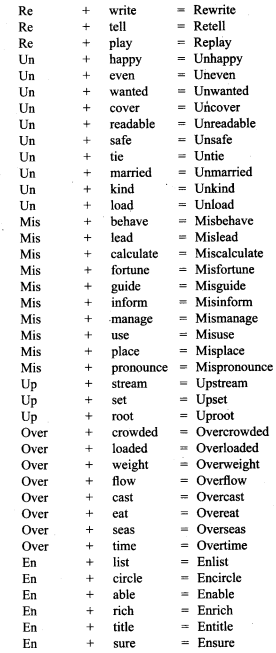
Suffix – Primary word के बाद जोड़े गये शब्दांश Suffix कहे जाते हैं जो Primary word के अर्थ में परिवर्तन कर देते हैं –
जैसे – agree + able = agreeable.
Primary Word + Suffix
![]()
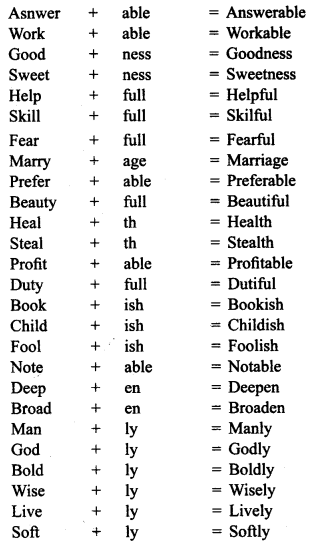
Sounds of Animals (पशुओं की आवाजौ)
- Dogs – bark
- Cats – mew
- Rats – squeak
- Lions – roar
- Pigs – grunt
- Horses – neigh
- Bees – buzz
- Goats/Sheeps – bleat
- Cocks – crow
- Snakes – hiss
- Ducks – quack
- Donkeys – bray
- Frogs – croak
- Birds – chirp
- Crows – caw
- Hens – cackle
Animals and their Homes
(पशु व अनेक घर)
Cows live in cowshed.
Lions live in den.
Dogs live in kennel.
Birds live in nest.
Pigs live in sty.
Horses live in stable.
Animals and their Young ones
(पशु और उनके बचे)
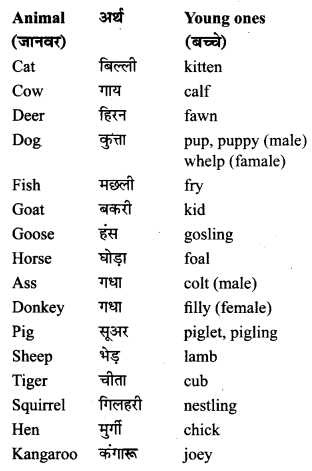
Punctuation
(पंक्चुएशन)
Punctuation का अर्थ होता है किसी वाक्य में full stop, comma आदि विराम चिन्ह का प्रयोग करना। इनके प्रयोग इस प्रकार हैं-
1. Full stop (.) हिन्दी के पूर्ण विराम (|) के स्थान पर अंग्रेजी में full stop (.) का प्रयोग होता है। इसका प्रयोग होता है।
(i) Affirmative, Negative site Imperative वाक्यों के अन्त में। जैसे –
She is playing Please, come here. She is not coming.
(ii) Abbreviations (संक्षिप्त शब्दों) तथा नामों के प्रारम्भ में। जैसे –
M.A., A. P. J. Abdul Kalam.
2. Comma (,) – Comma (अर्द्धविराम) का प्रयोग निम्न दशाओं में होता है –
(i) एक ही Part of Speech के कई शब्दों को एक-दूसरे से पृथक् करने के लिए;
जैसे – He can read, write and sing well.
(ii) And से जोड़े गये एक से अधिक शब्द समूहों को पृथक् करने के लिए;
जैसे – The minister addressed all, men and women, old and young.
(iii) Yes और No के बाद; जैसे –
Yes, I will do it.
No, I can’t do this.
(iv) Reported speech से शेष वाक्य को पृथक् करने के लिए; जैसे –
He said, “It is true.”
(v) Noun या Phrase in apposition को पृथक् करने के लिए; जैसे –
Milton, the great poet, was blind.
(vi) दिन, दिनांक या वर्ष को पृथक् करने के लिए;
जैसे – Monday, 6th June, 2007.
3. Question Mark (?) – प्रश्न चिन्ह (?)
प्रश्नवाचक वाक्यों के अन्त में लगाया जाता है; जैसे –
What is the time ?
4. Exclamation Mark (!)
इस चिन्ह का प्रयोग –
(i) Interjection के बाद में होता है; जैसे – Oh ! Alas!
(ii) इस चिन्ह का प्रयोग उन वाक्यों के अन्त में भी होता है जो गहन संवेग को व्यक्त करते हैं; जैसे –
What a beautiful picture !
5. Inverted Commas (“….”) – Direct Speech में किसी के कहे गये यथार्थ शब्दों को शेष वाक्य से पृथक् करने के लिए Inverted Commas आदि और अन्त में लगाये जाते हैं; जैसे –
He said, “I shall win.”
6. Apostrophe (‘) – इसका प्रयोग होता है।
(i) अक्षरों के लोप को प्रकट करने के लिए
Don’t, Won’t, Can’t
(ii) Possessive case बनाने के लिए Sita’s pen.
(iii) अक्षरों तथा संख्याओं का बहुवचन बनाने के लिए –
Add three 4’s and two 3’s.
Capital Letters – Capital letters का प्रयोग होता –
(i) वाक्य के प्रथम शब्द का प्रथम अक्षर लिखने के लिए।
He is my son.
(ii) Proper Nouns और उससे बने हुए Adjectives के प्रथम अक्षर को लिखने के लिए –
Asha, Delhi, Indian.
(iii) Pronoun I को लिखने के लिए …..
I am a teacher.
(iv) God, Almighty, Lord शब्दों के लिए प्रयुक्त Pronouns के प्रथम अक्षर लिखने के लिए।
Exercise
Punctuate the following sentences
- he sits next to his friend sonu his father teaches geography.
- come here sonam i have a rupee for you said rajan.
- is this your final decision asked ramesh.
- during our journey to delhi we slept read and played cards.
- don’t worry said akash i will give the pen to him.
Answer:
- He sits next to his friend, Sonu. His father teaches Geography.
- “Come here, Sonam. I have a rupee for you,” said Rajan.
- “Is this your final decision ?” asked Ramesh.
- During our journey to Delhi, we slept, read and played cards.
- “Don’t worry”, said Akash, “I will give the pen to him.”
We believe the information shared regarding MP Board Solutions for Class 7 English Chapter 21 Tansen Questions and Answers as far as our knowledge is concerned is true and reliable. In case of any queries or suggestions do leave us your feedback and our team will guide you at soonest possibility. Bookmark our site to avail latest updates on several state board Solutions at your fingertips.
